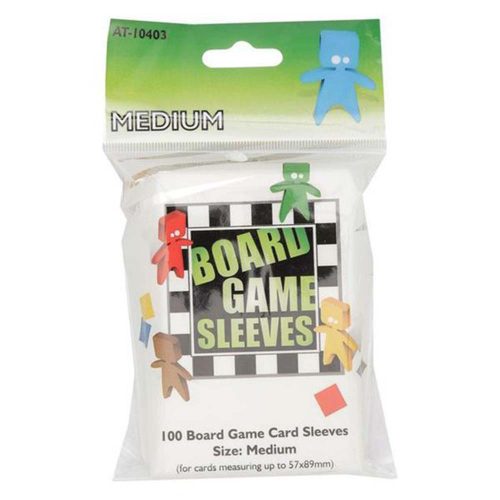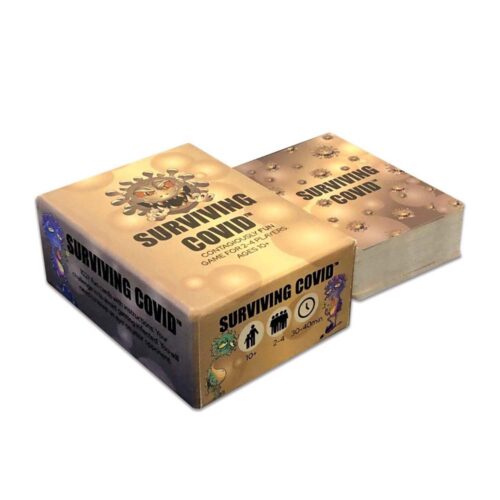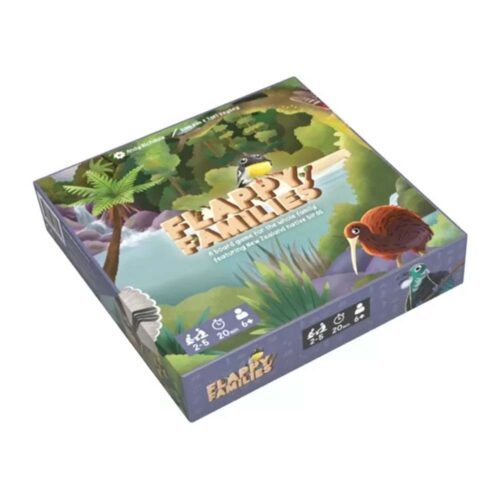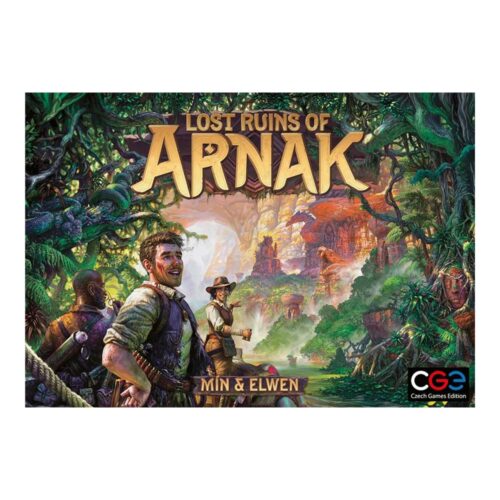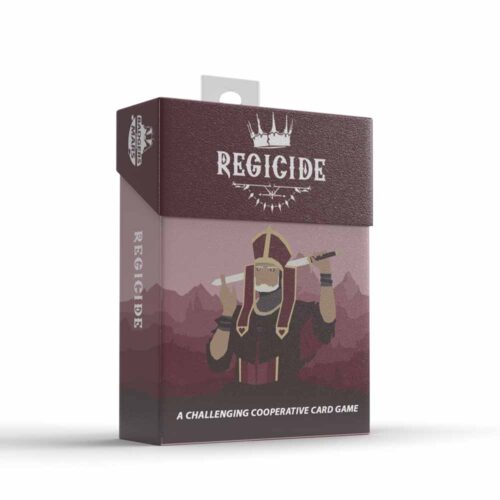 Regicide is a cooperative, fantasy card game for 1 to 4 players, with a deck of 54 premium playing cards uniquely illustrated by Sketchgoblin. Recruit heroes, storm the castle and defeat the corrupted Monarchy! In Regicide players must work together and use the unique powers of each suit to achieve victory.
Regicide is a cooperative, fantasy card game for 1 to 4 players, with a deck of 54 premium playing cards uniquely illustrated by Sketchgoblin. Recruit heroes, storm the castle and defeat the corrupted Monarchy! In Regicide players must work together and use the unique powers of each suit to achieve victory.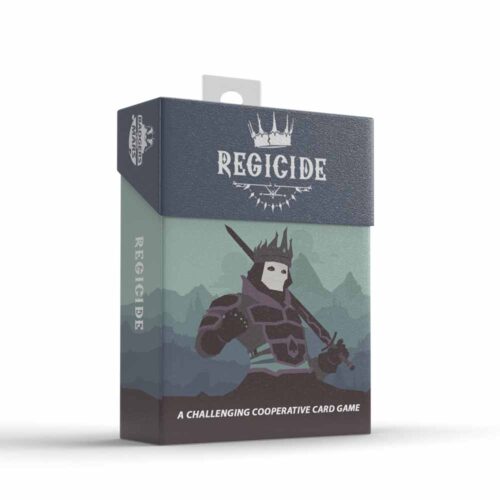 Regicide is a cooperative, fantasy card game for 1 to 4 players, with a deck of 54 premium playing cards uniquely illustrated by Sketchgoblin. Recruit heroes, storm the castle and defeat the corrupted Monarchy! In Regicide players must work together and use the unique powers of each suit to achieve victory.
Regicide is a cooperative, fantasy card game for 1 to 4 players, with a deck of 54 premium playing cards uniquely illustrated by Sketchgoblin. Recruit heroes, storm the castle and defeat the corrupted Monarchy! In Regicide players must work together and use the unique powers of each suit to achieve victory.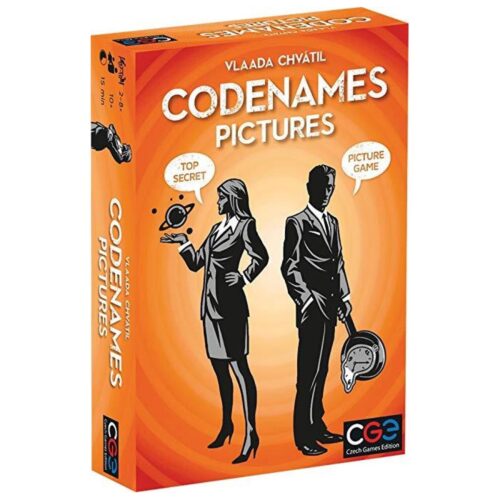 What are these strange symbols on the map? They are code for locations where spies must contact secret agents! Two rival spymasters know the agent in each location. They deliver coded messages telling their field operatives where to go for clandestine meetings. Operatives must be clever. A decoding mistake could lead to an unpleasant encounter with an enemy agent ? or worse, with the assassin! Both teams race to contact all their agents, but only one team can win. Codenames: Pictures differs from the original Codenames in that the agents are no longer represented by a single word, but by an image that contains multiple elements.
What are these strange symbols on the map? They are code for locations where spies must contact secret agents! Two rival spymasters know the agent in each location. They deliver coded messages telling their field operatives where to go for clandestine meetings. Operatives must be clever. A decoding mistake could lead to an unpleasant encounter with an enemy agent ? or worse, with the assassin! Both teams race to contact all their agents, but only one team can win. Codenames: Pictures differs from the original Codenames in that the agents are no longer represented by a single word, but by an image that contains multiple elements.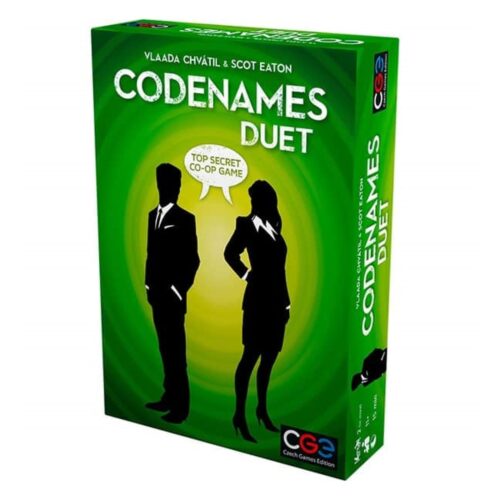 Codenames Duet keeps the basic elements of Codenames ? give one-word clues to try to get someone to identify your agents among those on the table ? but now you're working together as a team to find all of your agents. (Why you don't already know who your agents are is a question that Congressional investigators will get on your back about later!) To set up play, lay out 25 word cards in a 5?5 grid. Place a key card in the holder so that each player sees one side of the card. Each player sees a 5?5 grid on the card, with nine of the squares colored green (representing your agents) and three squares colored black (representing assassins). Three of the nine squares on each side are also green on the other side, one assassin is black on both sides, one is green on the other side and the other is an innocent bystander on the other side. Collectively, you need to reveal all fifteen agents ? without revealing an assassin ? before time runs out in order to win the game. Either player can decide to give the first one-word clue to the other player, along with a number. Whoever receives the clue places a finger on a card to identify that agent. If correct, they can attempt to identify another one. If they identify a bystander, then their guessing time ends. If they identify an assassin, you both lose! Unlike regular Codenames, they can keep guessing as long as they keep identifying an agent each time; this is useful for going back to previous clues and finding ones they missed earlier. After the first clue is given, players alternate giving clues.
Codenames Duet keeps the basic elements of Codenames ? give one-word clues to try to get someone to identify your agents among those on the table ? but now you're working together as a team to find all of your agents. (Why you don't already know who your agents are is a question that Congressional investigators will get on your back about later!) To set up play, lay out 25 word cards in a 5?5 grid. Place a key card in the holder so that each player sees one side of the card. Each player sees a 5?5 grid on the card, with nine of the squares colored green (representing your agents) and three squares colored black (representing assassins). Three of the nine squares on each side are also green on the other side, one assassin is black on both sides, one is green on the other side and the other is an innocent bystander on the other side. Collectively, you need to reveal all fifteen agents ? without revealing an assassin ? before time runs out in order to win the game. Either player can decide to give the first one-word clue to the other player, along with a number. Whoever receives the clue places a finger on a card to identify that agent. If correct, they can attempt to identify another one. If they identify a bystander, then their guessing time ends. If they identify an assassin, you both lose! Unlike regular Codenames, they can keep guessing as long as they keep identifying an agent each time; this is useful for going back to previous clues and finding ones they missed earlier. After the first clue is given, players alternate giving clues.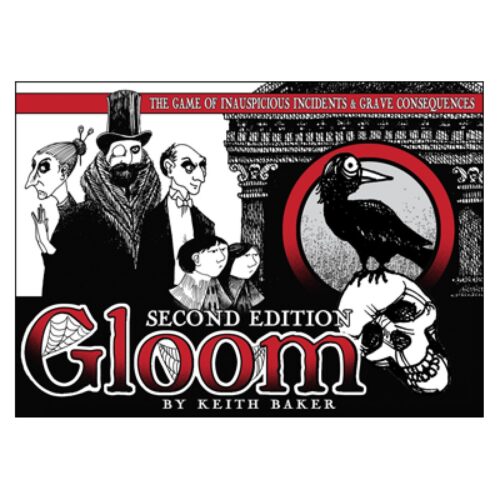 The world of Gloom is a sad and benighted place. The sky is gray, the tea is cold, and a new tragedy lies around every corner. Debt, disease, heartache, and packs of rabid flesh-eating mice?just when it seems like things can't get any worse, they do. But some say that one's reward in the afterlife is based on the misery endured in life. If so, there may yet be hope?if not in this world, then in the peace that lies beyond. In the Gloom card game, you assume control of the fate of an eccentric family of misfits and misanthropes. The goal of the game is sad, but simple: you want your characters to suffer the greatest tragedies possible before passing on to the well-deserved respite of death. You'll play horrible mishaps like Pursued by Poodles or Mocked by Midgets on your own characters to lower their Self-Worth scores, while trying to cheer your opponents' characters with marriages and other happy occasions that pile on positive points. The player with the lowest total Family Value wins. Printed on transparent plastic cards, Gloom features an innovative design by noted RPG author Keith Baker. Multiple modifier cards can be played on top of the same character card; since the cards are transparent, elements from previously played modifier cards either show through or are obscured by those played above them. You'll immediately and easily know the worth of every character, no matter how many modifiers they have. You've got to see (through) this game to believe it!
The world of Gloom is a sad and benighted place. The sky is gray, the tea is cold, and a new tragedy lies around every corner. Debt, disease, heartache, and packs of rabid flesh-eating mice?just when it seems like things can't get any worse, they do. But some say that one's reward in the afterlife is based on the misery endured in life. If so, there may yet be hope?if not in this world, then in the peace that lies beyond. In the Gloom card game, you assume control of the fate of an eccentric family of misfits and misanthropes. The goal of the game is sad, but simple: you want your characters to suffer the greatest tragedies possible before passing on to the well-deserved respite of death. You'll play horrible mishaps like Pursued by Poodles or Mocked by Midgets on your own characters to lower their Self-Worth scores, while trying to cheer your opponents' characters with marriages and other happy occasions that pile on positive points. The player with the lowest total Family Value wins. Printed on transparent plastic cards, Gloom features an innovative design by noted RPG author Keith Baker. Multiple modifier cards can be played on top of the same character card; since the cards are transparent, elements from previously played modifier cards either show through or are obscured by those played above them. You'll immediately and easily know the worth of every character, no matter how many modifiers they have. You've got to see (through) this game to believe it!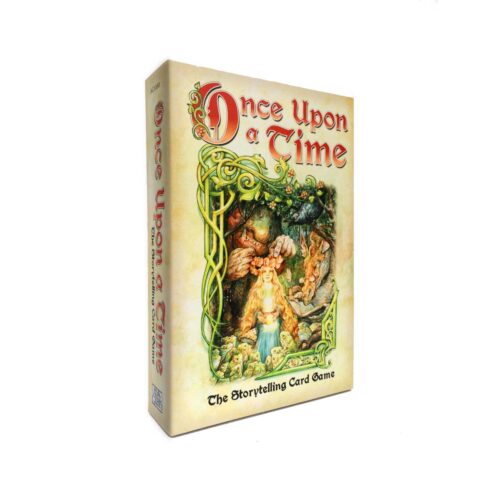 Once Upon A Time is a game in which the players create a story together, using cards that show typical elements from fairy tales. One player is the Storyteller and creates a story using the ingredients on their cards. They try to guide the plot towards their own ending. The other players try to use cards to interrupt the Storyteller and become the new Storyteller. The winner is the first player to play out all their cards and end with their Happy Ever After card. The second edition, published in 1995, features an expanded card set. The third edition, published in 2012, features multiple changes, including new artwork by Omar Rayyan, a new card set, and a simplified rulesheet. Box says: Contains 110 story cards, 55 ending cards and a rulebook(my box has 114 role cards)
Once Upon A Time is a game in which the players create a story together, using cards that show typical elements from fairy tales. One player is the Storyteller and creates a story using the ingredients on their cards. They try to guide the plot towards their own ending. The other players try to use cards to interrupt the Storyteller and become the new Storyteller. The winner is the first player to play out all their cards and end with their Happy Ever After card. The second edition, published in 1995, features an expanded card set. The third edition, published in 2012, features multiple changes, including new artwork by Omar Rayyan, a new card set, and a simplified rulesheet. Box says: Contains 110 story cards, 55 ending cards and a rulebook(my box has 114 role cards)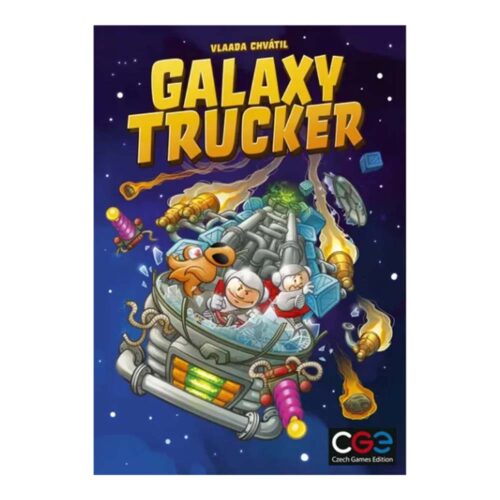 Author: Vlaada Chv?til Year: Summer 2021 Players: 2?4 Age: 8+ Time: 30 min Theme: Build a space ship and fly it across the Galaxy. Deliver goods for a profit ... if the pirates and meteors don't blast your ship apart. Mechanics: Players simultaneously build space ships out of tiles, which they grab as fast as they can.
Author: Vlaada Chv?til Year: Summer 2021 Players: 2?4 Age: 8+ Time: 30 min Theme: Build a space ship and fly it across the Galaxy. Deliver goods for a profit ... if the pirates and meteors don't blast your ship apart. Mechanics: Players simultaneously build space ships out of tiles, which they grab as fast as they can.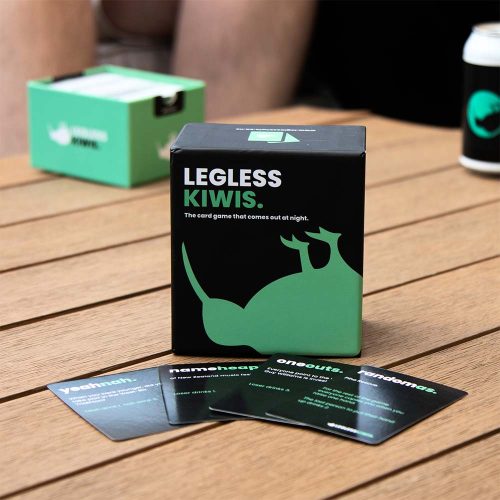 *ETA late-April 2024*This smash-hit drinking game from 2023 is more Kiwi than the Briscoes lady! Packed with over 300 cards, this 'Kiwi as' drinking games will have you and ya mates cracking up as you crack one open! Featuring:
*ETA late-April 2024*This smash-hit drinking game from 2023 is more Kiwi than the Briscoes lady! Packed with over 300 cards, this 'Kiwi as' drinking games will have you and ya mates cracking up as you crack one open! Featuring:- Find out juicy yarns from your mates in 'yeah nah'
- Call each other out with 'one outs'
- Rattle off loads of Kiwi stuff when you 'name heaps'
- Take part in 'random as' challenges
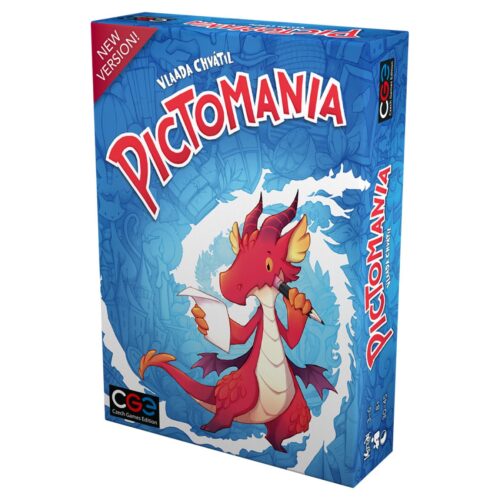 Is she drawing an elk or a moose? Is he drawing a pegasus or a unicorn? These are the types of questions you will probably be asking yourself during a game of Pictomania! There's no time to draw a complex masterpiece in Pictomania, the drawing game in which everybody draws and everybody guesses ? all at the same time! Players sketch the essence of the word with a few quick lines and try to guess the others' drawings while there's still time. This second edition of Pictomania features revised word cards with a brand new look. One big change for this edition compared to the base game is that only three word cards are in play no matter the player count, allowing you to jump into each round more quickly since you don't have to read as many words to guess who might be drawing what.
Is she drawing an elk or a moose? Is he drawing a pegasus or a unicorn? These are the types of questions you will probably be asking yourself during a game of Pictomania! There's no time to draw a complex masterpiece in Pictomania, the drawing game in which everybody draws and everybody guesses ? all at the same time! Players sketch the essence of the word with a few quick lines and try to guess the others' drawings while there's still time. This second edition of Pictomania features revised word cards with a brand new look. One big change for this edition compared to the base game is that only three word cards are in play no matter the player count, allowing you to jump into each round more quickly since you don't have to read as many words to guess who might be drawing what.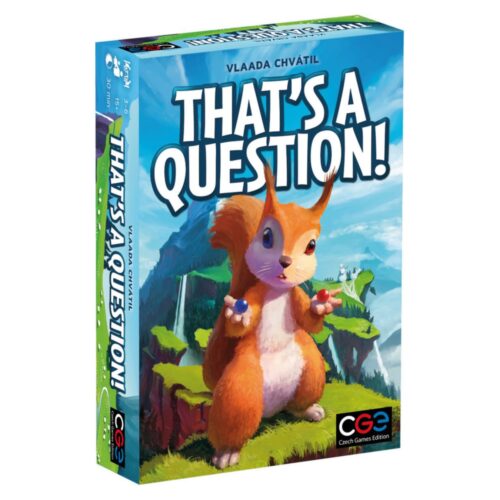 The party game That's a Question!, takes the familiar format of challenging others with questions, then voting on what they'll say. In more detail, each player has a hand of hexagonal cards, with words or phrases in three color blocks on the card. On a turn, you choose a player that has a token in front of them, take that token, then present them with a question by choosing one of the three question prompts (which are all color-coded), then choosing two cards from your hand and adding the properly-colored section of those cards to the question. A sample question: "What would you miss more if it ceases to exist: Facebook or doors?" That player secretly votes on A or B, while everyone else but the questioner secretly votes A or B depending on how they think the person will answer; a voter can optionally add their 3x scoring token to their vote. Once everyone votes, you reveal the tiles. Everyone who voted correctly moves ahead one or three spaces on the scoring track, and the questioner moves ahead one space for each person who voted incorrectly. If you pass a certain space on the scoring track, you retrieve your 3x token (if you've used it). Since you can ask a question only of those with a token in front of them, everyone is asked roughly the same number of questions, and whoever has the most points after a certain number of rounds wins.
The party game That's a Question!, takes the familiar format of challenging others with questions, then voting on what they'll say. In more detail, each player has a hand of hexagonal cards, with words or phrases in three color blocks on the card. On a turn, you choose a player that has a token in front of them, take that token, then present them with a question by choosing one of the three question prompts (which are all color-coded), then choosing two cards from your hand and adding the properly-colored section of those cards to the question. A sample question: "What would you miss more if it ceases to exist: Facebook or doors?" That player secretly votes on A or B, while everyone else but the questioner secretly votes A or B depending on how they think the person will answer; a voter can optionally add their 3x scoring token to their vote. Once everyone votes, you reveal the tiles. Everyone who voted correctly moves ahead one or three spaces on the scoring track, and the questioner moves ahead one space for each person who voted incorrectly. If you pass a certain space on the scoring track, you retrieve your 3x token (if you've used it). Since you can ask a question only of those with a token in front of them, everyone is asked roughly the same number of questions, and whoever has the most points after a certain number of rounds wins.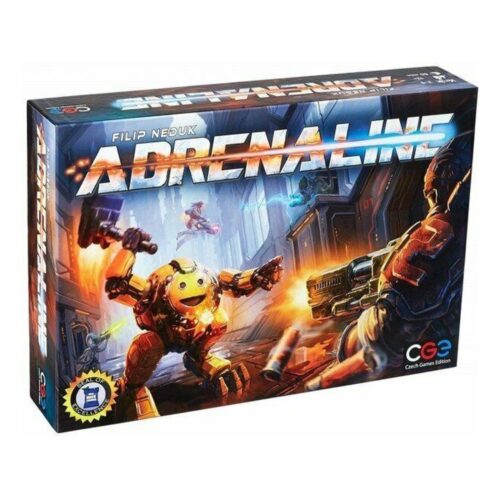 In the future, war has left the world in complete destruction and split the people into factions. The factions have decided to stop the endless war and settle their dispute in the arena. A new virtual bloodsport was created. The Adrenaline tournament. Every faction has a champion, every champion has a chance to fight and the chance to win. Will you take the chance of becoming the next champion of the Adrenaline tournament? Play a first-person shooter on your gaming table. Grab some ammo, grab a gun, and start shooting. Build up an arsenal for a killer turn. Combat resolution is quick and diceless. And if you get shot, you get faster!
In the future, war has left the world in complete destruction and split the people into factions. The factions have decided to stop the endless war and settle their dispute in the arena. A new virtual bloodsport was created. The Adrenaline tournament. Every faction has a champion, every champion has a chance to fight and the chance to win. Will you take the chance of becoming the next champion of the Adrenaline tournament? Play a first-person shooter on your gaming table. Grab some ammo, grab a gun, and start shooting. Build up an arsenal for a killer turn. Combat resolution is quick and diceless. And if you get shot, you get faster!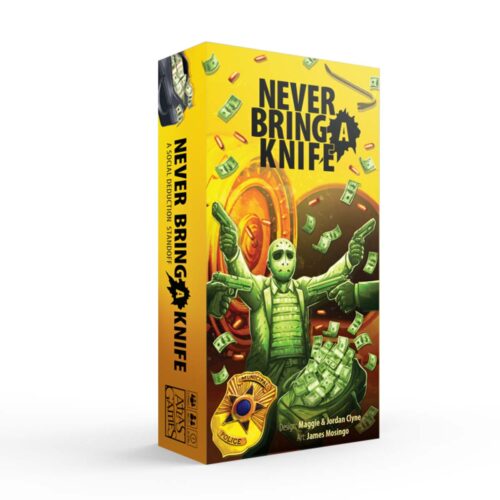 It was the critical moment in the heist of a lifetime when you found out the gang was compromised. Now it?s undercover cops and hardened criminals in a desperate shootout . . . and no one knows who?s who. Never Bring a Knife is a light, quick social deduction card game with less talking and more shooting. It's got fast-paced action inspired by modern action movies, and a new mechanical approach that's a breath of fresh air in the social deduction genre. When the first player falls, everyone who had the same role ? Cops or Criminals ? loses. The whole other team wins. Find your friends, keep your head down, and don?t tip your hand!
It was the critical moment in the heist of a lifetime when you found out the gang was compromised. Now it?s undercover cops and hardened criminals in a desperate shootout . . . and no one knows who?s who. Never Bring a Knife is a light, quick social deduction card game with less talking and more shooting. It's got fast-paced action inspired by modern action movies, and a new mechanical approach that's a breath of fresh air in the social deduction genre. When the first player falls, everyone who had the same role ? Cops or Criminals ? loses. The whole other team wins. Find your friends, keep your head down, and don?t tip your hand!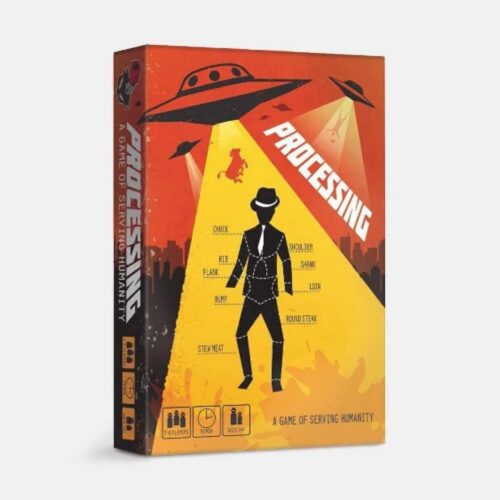 Processing is a game of terrible democracy. Aliens have conquered Earth, but that's not the worst of it. As a survivor, you've been enslaved to figure out who gets "Processed," "Probed," and "Freed." There's one more wrinkle, the Aliens think cows are people too. The Confederated Alien Overlords (or CAO's) demand you work to appease them all, but since they all want different things that will be tough. Your goal is to have the most victory points (VPs) by the end of the game (three rounds) by appealing to different alien agendas each round.
Processing is a game of terrible democracy. Aliens have conquered Earth, but that's not the worst of it. As a survivor, you've been enslaved to figure out who gets "Processed," "Probed," and "Freed." There's one more wrinkle, the Aliens think cows are people too. The Confederated Alien Overlords (or CAO's) demand you work to appease them all, but since they all want different things that will be tough. Your goal is to have the most victory points (VPs) by the end of the game (three rounds) by appealing to different alien agendas each round.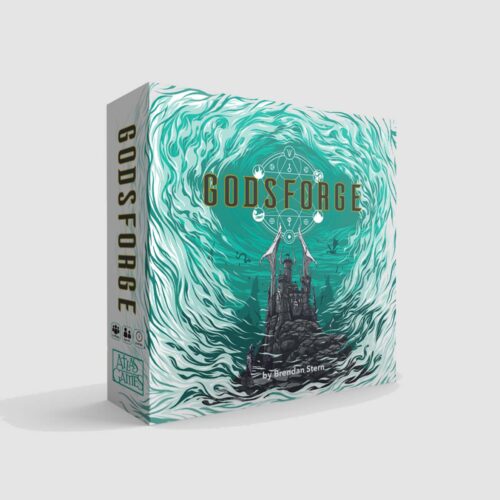 Godsforge features simultaneous play, with each player attacking the player to their left and defending against the player on their right. On a turn, everyone simultaneously rolls four dice, then each player lays one of their four cards face down in front of them. In any order you want, players reveal those cards, paying the cost of them via specific numbers on rolled dice, the sum of rolled dice, veilstones, or a combination of the above. On the dice, 1s can be any number you wish, while an unused 6 can be spent to acquire a veilstone.
Godsforge features simultaneous play, with each player attacking the player to their left and defending against the player on their right. On a turn, everyone simultaneously rolls four dice, then each player lays one of their four cards face down in front of them. In any order you want, players reveal those cards, paying the cost of them via specific numbers on rolled dice, the sum of rolled dice, veilstones, or a combination of the above. On the dice, 1s can be any number you wish, while an unused 6 can be spent to acquire a veilstone.


